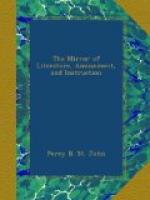On such occasions we have often wished ourselves “far from the sight of city, spire, or sound of minster clock.” One feels most for the sheep and lambs, when the softened fancy recurs to the streams and hedgerows, and pleasant pastures, from whence the woolly exiles have been ejected; and yet the emotion of pity isnot wholly unaccompanied by admiration at the sagacity of the canine disciplinarians that bay them remorselessly forward, and sternly refuse the stragglers permission to make a reconnoissance on the road. They are highly respectable members of society these same sheep-dogs, and we wish we could say as much for “the curs of low degree,” that just at the same hour begin to prowl up and down St. Giles’s, and to and fro in it, seeking what they may devour, with the fear of the Alderman of Cripplegate Within before their eyes. The feline kind, however, have reason to think themselves in more danger at the first round of the watering cart, for we have often rescued an unsuspicious tortoise-shell from the felonious designs of a skin-dealer, who was about to lay violent hands on unoffending puss, while she was watching the process of making bread through the crevices of a Scotch grating.[6]
[6] They say that no town
in Europe is without a Scotchman for an
inhabitant.
This trade in London is generally professed by North
Britons,
and it is always a cause of alarm to a stranger if
he
notices
the enormous column of black smoke which is emitted
from
their
premises at the dawn, of the morning.
Another animal sui generis, occasionally visible about the same cock-crowing season, is the parliamentary reporter, shuffling to roost, and a more slovenly-looking operative from sunrise to sunset is rarely to be seen. There has probably been a double debate, and between three and five o’clock he has written “a column bould.” No one can well mistake him. The features are often Irish, the gait jaunty or resolutely brisk, but neither “buxom, blithe, nor debonnair,” complexion wan, expression pensive, and the entire propriety of the toilette disarranged and degagee. The stuff that he has perpetrated is happily no longer present to his memory, and neither placeman’s sophistry nor patriot’s rant will be likely in any way to interfere with his repose. Intense fatigue, whether intellectual or manual, however, is not the best security for sound slumber at any hour, more particularly in the morning.
Even at this hour the swart Savoyard (filius nullius) issues forth on his diurnal pilgrimage, “remote, unfriended, melancholy, slow,” to excruciate on his superannuated hurdy-gurdy that sublime melody, “the hundred and seventh psalm,” or the plaintive sweetness of “Isabel,” perhaps speculating on a breakfast for himself and Pug, somewhere between Knightsbridge and Old Brentford. Poor fellow! Could he procure a few bones of mutton, how hard would it be for his hungry comprehension to understand the displeasure which similar objects occasioned to Attila on the plains of Champagne!




